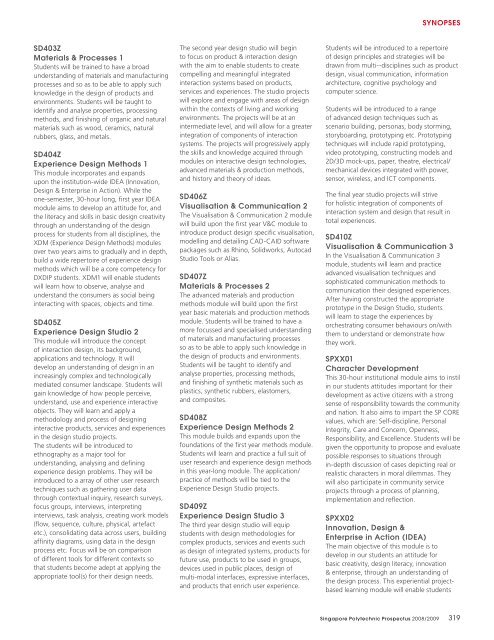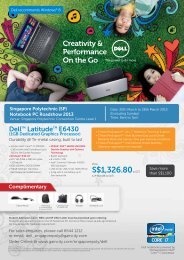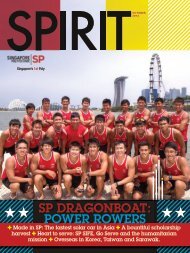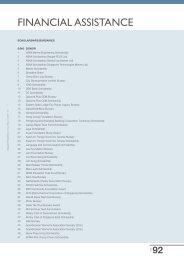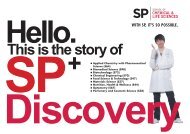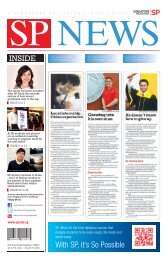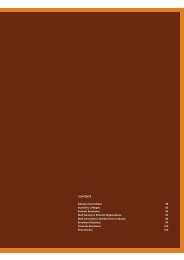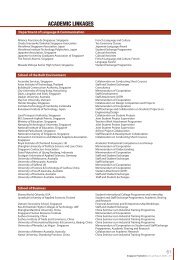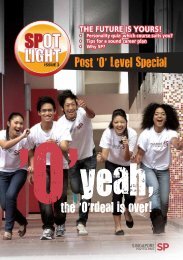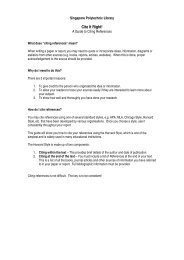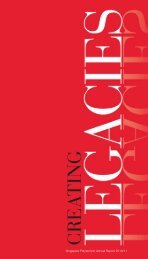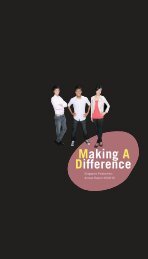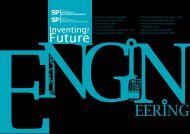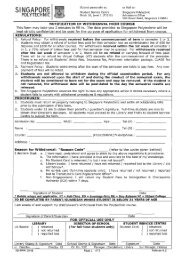SYNOPSES - Singapore Polytechnic
SYNOPSES - Singapore Polytechnic
SYNOPSES - Singapore Polytechnic
You also want an ePaper? Increase the reach of your titles
YUMPU automatically turns print PDFs into web optimized ePapers that Google loves.
<strong>SYNOPSES</strong>SD403ZMaterials & Processes 1Students will be trained to have a broadunderstanding of materials and manufacturingprocesses and so as to be able to apply suchknowledge in the design of products andenvironments. Students will be taught toidentify and analyse properties, processingmethods, and finishing of organic and naturalmaterials such as wood, ceramics, naturalrubbers, glass, and metals.SD404ZExperience Design Methods 1This module incorporates and expandsupon the institution-wide IDEA (Innovation,Design & Enterprise in Action). While theone-semester, 30-hour long, first year IDEAmodule aims to develop an attitude for, andthe literacy and skills in basic design creativitythrough an understanding of the designprocess for students from all disciplines, theXDM (Experience Design Methods) modulesover two years aims to gradually and in depth,build a wide repertoire of experience designmethods which will be a core competency forDXDIP students. XDM1 will enable studentswill learn how to observe, analyse andunderstand the consumers as social beinginteracting with spaces, objects and time.SD405ZExperience Design Studio 2This module will introduce the conceptof interaction design, its background,applications and technology. It willdevelop an understanding of design in anincreasingly complex and technologicallymediated consumer landscape. Students willgain knowledge of how people perceive,understand, use and experience interactiveobjects. They will learn and apply amethodology and process of designinginteractive products, services and experiencesin the design studio projects.The students will be introduced toethnography as a major tool forunderstanding, analysing and definingexperience design problems. They will beintroduced to a array of other user researchtechniques such as gathering user datathrough contextual inquiry, research surveys,focus groups, interviews, interpretinginterviews, task analysis, creating work models(flow, sequence, culture, physical, artefactetc.), consolidating data across users, buildingaffinity diagrams, using data in the designprocess etc. Focus will be on comparisonof different tools for different contexts sothat students become adept at applying theappropriate tool(s) for their design needs.The second year design studio will beginto focus on product & interaction designwith the aim to enable students to createcompelling and meaningful integratedinteraction systems based on products,services and experiences. The studio projectswill explore and engage with areas of designwithin the contexts of living and workingenvironments. The projects will be at anintermediate level, and will allow for a greaterintegration of components of interactionsystems. The projects will progressively applythe skills and knowledge acquired throughmodules on interactive design technologies,advanced materials & production methods,and history and theory of ideas.SD406ZVisualisation & Communication 2The Visualisation & Communication 2 modulewill build upon the first year V&C module tointroduce product design specific visualisation,modelling and detailing CAD-CAID softwarepackages such as Rhino, Solidworks, AutocadStudio Tools or Alias.SD407ZMaterials & Processes 2The advanced materials and productionmethods module will build upon the firstyear basic materials and production methodsmodule. Students will be trained to have amore focussed and specialised understandingof materials and manufacturing processesso as to be able to apply such knowledge inthe design of products and environments.Students will be taught to identify andanalyse properties, processing methods,and finishing of synthetic materials such asplastics, synthetic rubbers, elastomers,and composites.SD408ZExperience Design Methods 2This module builds and expands upon thefoundations of the first year methods module.Students will learn and practice a full suit ofuser research and experience design methodsin this year-long module. The application/practice of methods will be tied to theExperience Design Studio projects.SD409ZExperience Design Studio 3The third year design studio will equipstudents with design methodologies forcomplex products, services and events suchas design of integrated systems, products forfuture use, products to be used in groups,devices used in public places, design ofmulti-modal interfaces, expressive interfaces,and products that enrich user experience.Students will be introduced to a repertoireof design principles and strategies will bedrawn from multi--disciplines such as productdesign, visual communication, informationarchitecture, cognitive psychology andcomputer science.Students will be introduced to a rangeof advanced design techniques such asscenario building, personas, body storming,storyboarding, prototyping etc. Prototypingtechniques will include rapid prototyping,video prototyping, constructing models and2D/3D mock-ups, paper, theatre, electrical/mechanical devices integrated with power,sensor, wireless, and ICT components.The final year studio projects will strivefor holistic integration of components ofinteraction system and design that result intotal experiences.SD410ZVisualisation & Communication 3In the Visualisation & Communication 3module, students will learn and practiceadvanced visualisation techniques andsophisticated communication methods tocommunication their designed experiences.After having constructed the appropriateprototype in the Design Studio, studentswill learn to stage the experiences byorchestrating consumer behaviours on/withthem to understand or demonstrate howthey work.SPXX01Character DevelopmentThis 30-hour institutional module aims to instilin our students attitudes important for theirdevelopment as active citizens with a strongsense of responsibility towards the communityand nation. It also aims to impart the SP COREvalues, which are: Self-discipline, PersonalIntegrity, Care and Concern, Openness,Responsibility, and Excellence. Students will begiven the opportunity to propose and evaluatepossible responses to situations throughin-depth discussion of cases depicting real orrealistic characters in moral dilemmas. Theywill also participate in community serviceprojects through a process of planning,implementation and reflection.SPXX02Innovation, Design &Enterprise in Action (IDEA)The main objective of this module is todevelop in our students an attitude forbasic creativity, design literacy, innovation& enterprise, through an understanding ofthe design process. This experiential projectbasedlearning module will enable students<strong>Singapore</strong> <strong>Polytechnic</strong> Prospectus 2008/2009 319


